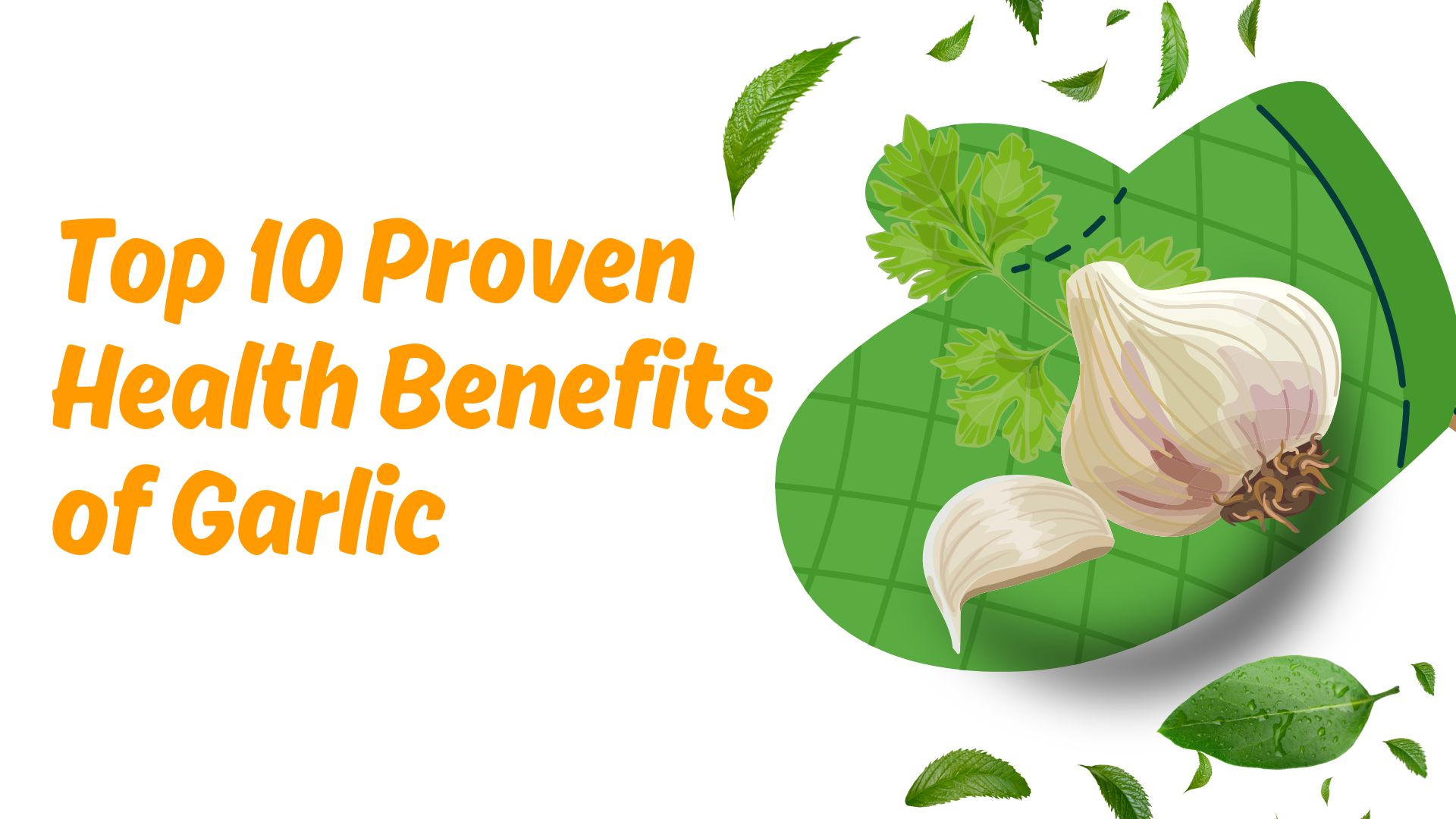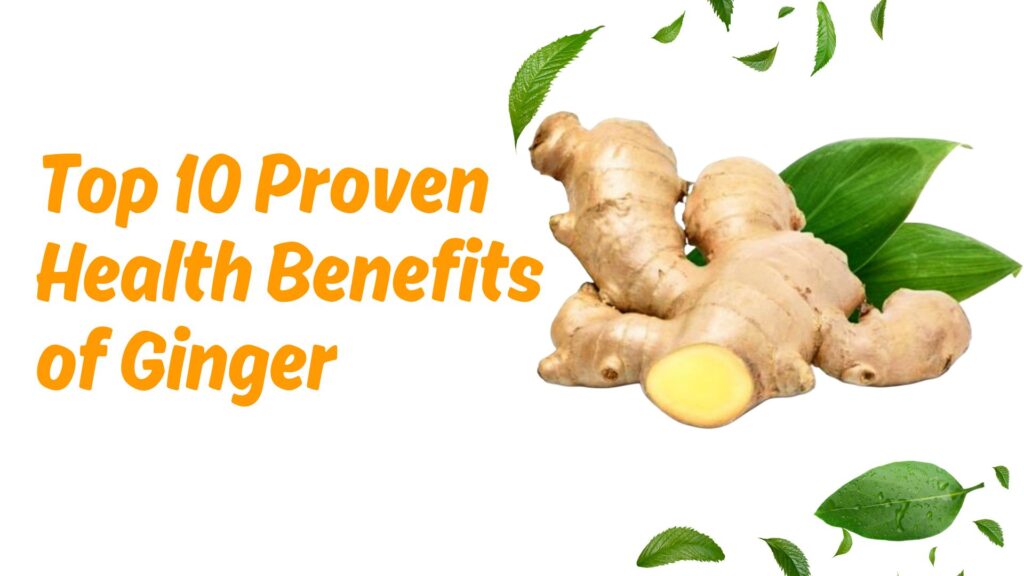
Top 10 Proven Health Benefits of Garlic
Garlic has been celebrated for centuries — not just for its strong, distinctive flavor, but for its incredible health benefits. Ancient civilizations like the Egyptians, Greeks, Romans, and Chinese considered garlic a medicinal treasure. Today, modern science confirms what our ancestors knew: garlic is a natural powerhouse for the body.
Whether you enjoy it raw, roasted, in soups, or as a supplement, garlic offers a long list of health advantages. In this article, we’ll explore the top 10 proven health benefits of garlic, backed by research, plus tips on how to use it effectively, and answers to common questions.
1. Boosts Immune System and Fights Illness
Garlic is rich in compounds like allicin, which have powerful antibacterial, antiviral, and antifungal properties. These help your body fight off infections and strengthen immune function.
-
Why it matters: A strong immune system means fewer colds, quicker recovery, and better overall health.
-
Research says: Studies show that daily garlic consumption can reduce the frequency and severity of common colds by up to 63%.
Tip: Crush or chop fresh garlic and let it sit for 10 minutes before cooking. This helps preserve allicin, the main immune-boosting compound.
2. Supports Heart Health and Lowers Blood Pressure
High blood pressure (hypertension) is a leading cause of heart disease and stroke. Garlic has been shown to naturally reduce blood pressure levels in people with hypertension.
-
How it works: Allicin and sulfur compounds relax blood vessels and improve circulation.
-
Research says: Consuming 600–1,500 mg of aged garlic extract daily for 24 weeks can be as effective as some prescription medications.
Tip: If you have high blood pressure, adding garlic to your daily meals can be a simple, natural addition to your health routine.
3. Reduces Cholesterol Levels
High cholesterol is another major risk factor for heart disease. Garlic can help lower total cholesterol and LDL cholesterol (the “bad” kind), while maintaining HDL cholesterol (the “good” kind).
-
Research says: Garlic supplementation can lower LDL cholesterol by 10–15% in people with high cholesterol.
-
Bonus: Garlic also prevents plaque buildup in arteries.
Tip: Try adding raw garlic to salads, dips, or dressings for maximum heart health benefits.
4. Rich in Antioxidants for Anti-Aging
Garlic is packed with antioxidants, which help fight oxidative stress — a key factor in aging and many chronic diseases.
-
Benefits include: Reduced inflammation, improved skin health, and better protection against cell damage.
-
Research says: Antioxidants in garlic can help prevent cognitive decline and diseases like Alzheimer’s and dementia.
Tip: Pair garlic with antioxidant-rich foods like spinach, berries, or olive oil for even greater benefits.
5. Helps Detoxify Heavy Metals
Garlic’s sulfur compounds protect your organs from damage caused by heavy metal toxicity.
-
Research says: In a study of workers exposed to high levels of lead, garlic reduced blood lead levels by 19% and significantly reduced symptoms of toxicity.
-
Why it matters: Daily exposure to pollutants, pesticides, and metals can build up in our bodies. Garlic helps flush them out.
Tip: Use garlic in combination with cruciferous vegetables (like broccoli and kale) for a more powerful detox.
6. Improves Bone Health
Garlic may increase estrogen levels in women, which can reduce bone loss as they age.
-
Research says: Daily consumption of dry garlic extract reduced a marker of estrogen deficiency in postmenopausal women.
-
Extra benefits: Garlic also contains manganese, vitamin B6, and vitamin C — all important for bone health.
Tip: If you’re a woman over 40, regular garlic intake can help protect against osteoporosis.
7. Supports Healthy Digestion
Garlic encourages the growth of healthy gut bacteria while preventing harmful bacteria from taking over.
-
Why it matters: Good gut health improves digestion, nutrient absorption, and immunity.
-
Extra benefit: Garlic’s antibacterial properties help fight infections like food poisoning.
Tip: If raw garlic is too strong for your stomach, roast or lightly sauté it to make it gentler while keeping most benefits.
8. Regulates Blood Sugar Levels
Garlic can improve insulin sensitivity, making it beneficial for people with type 2 diabetes or at risk of developing it.
-
Research says: Garlic supplementation can reduce fasting blood sugar levels.
-
Why it matters: Better blood sugar control means lower risk of diabetes-related complications.
Tip: Combine garlic with other blood-sugar-friendly foods like cinnamon, whole grains, and leafy greens.
9. May Help Prevent Cancer
Garlic contains compounds that may help reduce the risk of certain cancers, especially stomach, colon, and prostate cancers.
-
How it works: Garlic’s antioxidants and sulfur compounds reduce inflammation, prevent DNA damage, and inhibit tumor growth.
-
Research says: Populations with high garlic consumption have lower rates of certain cancers.
Tip: Eating garlic raw a few times a week may provide stronger cancer-fighting effects.
10. Enhances Athletic Performance
In ancient Greece, garlic was given to Olympic athletes for stamina and performance.
-
Modern benefits: Garlic may improve exercise capacity by reducing fatigue and enhancing oxygen use.
-
Research says: In some studies, people with heart disease who took garlic oil for 6 weeks improved their exercise tolerance by 12%.
Tip: Include garlic in your pre-workout meal for a natural performance boost.
How to Add More Garlic to Your Diet
-
Raw garlic: Best for maximum health benefits — crush or chop and add to dips, salads, and sauces.
-
Cooked garlic: Milder but still beneficial — sauté, roast, or bake.
-
Garlic supplements: Aged garlic extract, garlic oil, or capsules are good for those who don’t enjoy the taste.
Possible Side Effects & Precautions
While garlic is safe for most people, high doses may cause:
-
Bad breath and body odor
-
Digestive upset
-
Increased bleeding risk (especially if taking blood thinners)
-
Allergic reactions (rare)
Tip: If you have a bleeding disorder, are pregnant, or are on certain medications, consult your doctor before taking large amounts of garlic.
Frequently Asked Questions (FAQs)
1. Is garlic better raw or cooked?
Raw garlic contains more allicin, but cooked garlic still has plenty of health benefits.
2. How much garlic should I eat daily?
For general health, 1–2 cloves per day is enough. For medicinal purposes, studies often use the equivalent of 3–4 cloves.
3. Can garlic help with weight loss?
Indirectly, yes — garlic supports metabolism, improves digestion, and regulates blood sugar, which can help manage weight.
4. Is garlic good for women’s health?
Yes, garlic can support hormonal balance, bone health, and immunity, especially during menopause.
5. Can I take garlic supplements instead of eating it?
Yes, but choose standardized supplements with aged garlic extract for the best results.
Final Thoughts
Garlic isn’t just a kitchen staple — it’s one of nature’s most powerful superfoods. From boosting your immune system to protecting your heart, lowering blood pressure, and even helping detox your body, garlic deserves a regular place on your plate.
If you want better health naturally, make garlic a part of your daily routine — your body will thank you.


